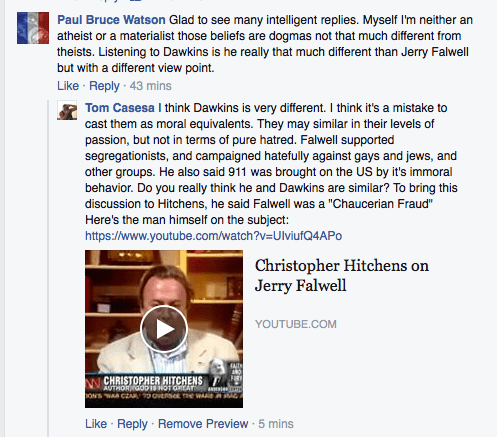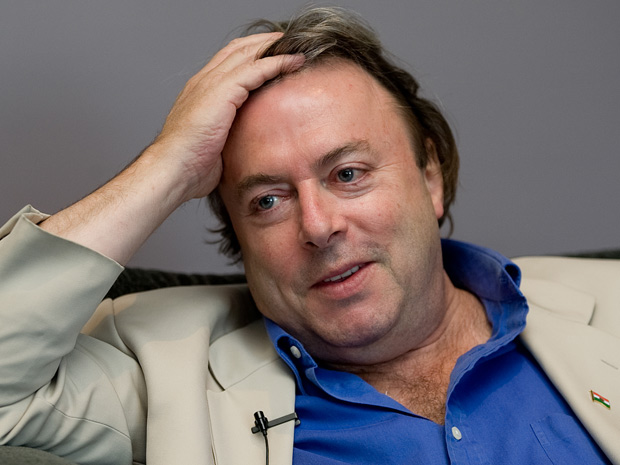
This is timely as just yesterday I posted about astrophysicist Lawrence Krauss, who was a friend to Hitchens, and whose work Hitch admired (particularly the arguments that eventually became his book “A Universe From Nothing“.
On Christmas Day, the Wall Street Journal published an article from Eric Metaxas suggesting that the likelihood of the universe being intelligently designed has increased. It is a chapter from his book “Miracles: What They Are, Why They Happen, and How They Can Change Your Life” (Dutton Adult, 2014)
Before any intelligent design fans get too excited, they should read Krauss’ response, which he wrote to the editors of the WSJ. Here are both pieces.
ERIC METAXAS PIECE (reprinted from WSJ)
Science Increasingly Makes the Case for God
By ERIC METAXAS
Dec. 25, 2014 4:56 p.m. ET
In 1966 Time magazine ran a cover story asking: Is God Dead? Many have accepted the cultural narrative that he’s obsolete—that as science progresses, there is less need for a “God” to explain the universe. Yet it turns out that the rumors of God’s death were premature. More amazing is that the relatively recent case for his existence comes from a surprising place—science itself.
Here’s the story: The same year Time featured the now-famous headline, the astronomer Carl Sagan announced that there were two important criteria for a planet to support life: The right kind of star, and a planet the right distance from that star. Given the roughly octillion—1 followed by 27 zeros—planets in the universe, there should have been about septillion—1 followed by 24 zeros—planets capable of supporting life.
With such spectacular odds, the Search for Extraterrestrial Intelligence, a large, expensive collection of private and publicly funded projects launched in the 1960s, was sure to turn up something soon. Scientists listened with a vast radio telescopic network for signals that resembled coded intelligence and were not merely random. But as years passed, the silence from the rest of the universe was deafening. Congress defunded SETI in 1993, but the search continues with private funds. As of 2014, researchers have discovered precisely bubkis—0 followed by nothing.
What happened? As our knowledge of the universe increased, it became clear that there were far more factors necessary for life than Sagan supposed. His two parameters grew to 10 and then 20 and then 50, and so the number of potentially life-supporting planets decreased accordingly. The number dropped to a few thousand planets and kept on plummeting.
Even SETI proponents acknowledged the problem. Peter Schenkel wrote in a 2006 piece for Skeptical Inquirer magazine: “In light of new findings and insights, it seems appropriate to put excessive euphoria to rest . . . . We should quietly admit that the early estimates . . . may no longer be tenable.”
As factors continued to be discovered, the number of possible planets hit zero, and kept going. In other words, the odds turned against any planet in the universe supporting life, including this one. Probability said that even we shouldn’t be here.
Today there are more than 200 known parameters necessary for a planet to support life—every single one of which must be perfectly met, or the whole thing falls apart. Without a massive planet like Jupiter nearby, whose gravity will draw away asteroids, a thousand times as many would hit Earth’s surface. The odds against life in the universe are simply astonishing.
Yet here we are, not only existing, but talking about existing. What can account for it? Can every one of those many parameters have been perfect by accident? At what point is it fair to admit that science suggests that we cannot be the result of random forces? Doesn’t assuming that an intelligence created these perfect conditions require far less faith than believing that a life-sustaining Earth just happened to beat the inconceivable odds to come into being?
There’s more. The fine-tuning necessary for life to exist on a planet is nothing compared with the fine-tuning required for the universe to exist at all. For example, astrophysicists now know that the values of the four fundamental forces—gravity, the electromagnetic force, and the “strong” and “weak” nuclear forces—were determined less than one millionth of a second after the big bang. Alter any one value and the universe could not exist. For instance, if the ratio between the nuclear strong force and the electromagnetic force had been off by the tiniest fraction of the tiniest fraction—by even one part in 100,000,000,000,000,000—then no stars could have ever formed at all. Feel free to gulp.
Multiply that single parameter by all the other necessary conditions, and the odds against the universe existing are so heart-stoppingly astronomical that the notion that it all “just happened” defies common sense. It would be like tossing a coin and having it come up heads 10 quintillion times in a row. Really?
Fred Hoyle, the astronomer who coined the term “big bang,” said that his atheism was “greatly shaken” at these developments. He later wrote that “a common-sense interpretation of the facts suggests that a super-intellect has monkeyed with the physics, as well as with chemistry and biology . . . . The numbers one calculates from the facts seem to me so overwhelming as to put this conclusion almost beyond question.”
Theoretical physicist Paul Davies has said that “the appearance of design is overwhelming” and Oxford professor Dr. John Lennox has said “the more we get to know about our universe, the more the hypothesis that there is a Creator . . . gains in credibility as the best explanation of why we are here.”
The greatest miracle of all time, without any close seconds, is the universe. It is the miracle of all miracles, one that ineluctably points with the combined brightness of every star to something—or Someone—beyond itself.
Mr. Metaxas is the author, most recently, of “Miracles: What They Are, Why They Happen, and How They Can Change Your Life” ( Dutton Adult, 2014).
LAWRENCE KRAUSS RESPONSE to the WSJ
To the editor:
I was rather surprised to read the unfortunate oped piece “Science Increasingly makes the case for God”, written not by a scientist but a religious writer with an agenda. The piece was rife with inappropriate scientific misrepresentations. For example:
We currently DO NOT know the factors that allow the evolution of life in the Universe. We know the many factors that were important here on Earth, but we do not know what set of other factors might allow a different evolutionary history elsewhere. The mistake made by the author is akin to saying that if one looks at all the factors in my life that led directly to my sitting at my computer to write this, one would obtain a probability so small as to conclude that it is impossible that anyone else could ever sit down to compose a letter to the WSJ.
We have discovered many more planets around stars in our galaxy than we previously imagined, and many more forms of life existing in extreme environments in our planet than were known when early estimates of the frequency of life in the universe were first made. If anything, the odds have increased, not decreased.
The Universe would certainly continue to exist even if the strength of the four known forces was different. It is true that if the forces had vastly different strengths (nowhere near as tiny as the fine-scale variation asserted by the writer) then life as we know it would probably not evolved. This is more likely an example of life being fine-tuned for the universe in which it evolved, rather than the other way around.
My ASU colleague Paul Davies may have said that “the appearance of design is overwhelming”, but his statement should not be misinterpreted. The appearance of design of life on Earth is also overwhelming, but we now understand, thanks to Charles Darwin that the appearance of design is not the same as design, it is in fact a remnant of the remarkable efficiency of natural selection.
Religious arguments for the existence of God thinly veiled as scientific arguments do a disservice to both science and religion, and by allowing a Christian apologist to masquerade as a scientist WSJ did a disservice to its readers.




